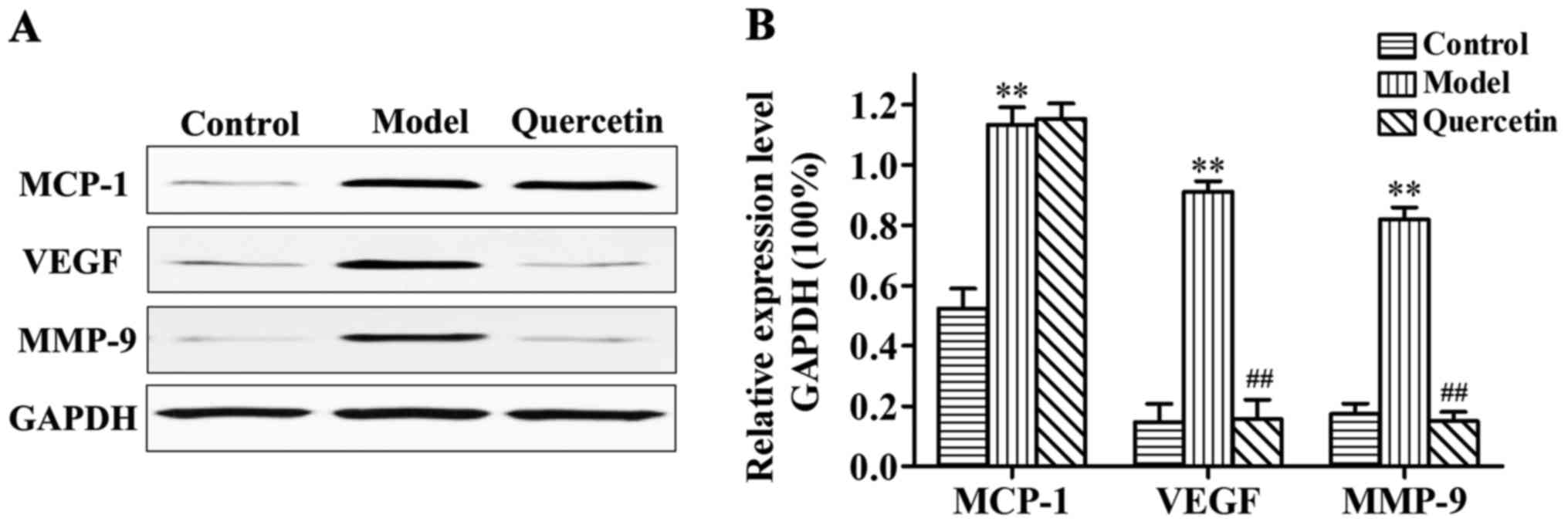|
1
|
Funatsu H, Yamashita H, Nakamura S, Mimura
T, Eguchi S, Noma H and Hori S: Vitreous levels of pigment
epithelium-derived factor and vascular endothelial growth factor
are related to diabetic macular edema. Ophthalmology. 113:294–301.
2006. View Article : Google Scholar : PubMed/NCBI
|
|
2
|
Qaum T, Xu Q, Joussen AM, Clemens MW, Qin
W, Miyamoto K, Hassessian H, Wiegand SJ, Rudge J, Yancopoulos GD,
et al: VEGF-initiated blood-retinal barrier breakdown in early
diabetes. Invest Ophthalmol Vis Sci. 42:2408–2413. 2001.PubMed/NCBI
|
|
3
|
Kant S, Seth G and Anthony K: Vascular
endothelial growth factor-A (VEGF-A) in vitreous fluid of patients
with proliferative diabetic retinopathy. Ann Ophthalmol (Skokie).
41:170–173. 2009.PubMed/NCBI
|
|
4
|
Eichler W, Yafai Y, Keller T, Wiedemann P
and Reichenbach A: PEDF derived from glial Müller cells: A possible
regulator of retinal angiogenesis. Exp Cell Res. 299:68–78. 2004.
View Article : Google Scholar : PubMed/NCBI
|
|
5
|
Jorge R, Costa RA, Calucci D, Cintra LP
and Scott IU: Intravitreal bevacizumab (Avastin) for persistent new
vessels in diabetic retinopathy (IBEPE study). Retina.
26:1006–1013. 2006. View Article : Google Scholar : PubMed/NCBI
|
|
6
|
Zhang SX, Wang JJ, Gao G, Parke K and Ma
JX: Pigment epithelium-derived factor downregulates vascular
endothelial growth factor (VEGF) expression and inhibits VEGF-VEGF
receptor 2 binding in diabetic retinopathy. J Mol Endocrinol.
37:l–12. 2006. View Article : Google Scholar
|
|
7
|
Kim JO, Lee GD, Kwon JH and Kim KS:
Anti-diabetic effects of new herbal formula in neonatally
streptozotocin-induced diabetic rats. Biol Pharm Bull. 32:421–426.
2009. View Article : Google Scholar : PubMed/NCBI
|
|
8
|
Forsyth PA, Wong H, Laing TD, Rewcastle
NB, Morris DG, Muzik H, Leco KJ, Johnston RN, Brasher PM,
Sutherland G, et al: Gelatinase-A (MMP-2), gelatinase-B (MMP-9) and
membrane type matrix metalloproteinase-1 (MT1-MMP) are involved in
different aspects of the pathophysiology of malignant gliomas. Br J
Cancer. 79:1828–1835. 1999. View Article : Google Scholar : PubMed/NCBI
|
|
9
|
Robison WG Jr, Laver NM, Jacot JL,
Chandler ML, York BM and Glover JP: Efficacy of treatment after
measurable diabetic-like retinopathy in galactose-fed rats. Invest
Ophthalmol Vis Sci. 38:1066–1073. 1997.PubMed/NCBI
|
|
10
|
Joussen AM, Poulaki V, Mitsiades N,
Kirchhof B, Koizumi K, Döhmen S and Adamis AP: Nonsteroidal
anti-inflammatory drugs prevent early diabetic retinopathy via
TNF-alpha suppression. FASEB J. 16:438–440. 2002.PubMed/NCBI
|
|
11
|
Zhang TT and Jiang JG: Active ingredients
of traditional Chinese medicine in the treatment of diabetes and
diabetic complications. Expert Opin Investig Drugs. 21:1625–1642.
2012. View Article : Google Scholar : PubMed/NCBI
|
|
12
|
Aiello LP: Angiogenic pathways in diabetic
retinopathy. N Engl J Med. 353:839–841. 2005. View Article : Google Scholar : PubMed/NCBI
|
|
13
|
Kim JH, Kim JH, Yu YS, Cho CS and Kim KW:
Blockade of angiotensin II attenuates VEGF-mediated blood-retinal
barrier breakdown in diabetic retinopathy. J Cereb Blood Flow
Metab. 29:621–628. 2009. View Article : Google Scholar : PubMed/NCBI
|
|
14
|
Adamiec-Mroczek J, Oficjalska-Młyńczak J
and Misiuk-Hojło M: Proliferative diabetic retinopathy - The
influence of diabetes control on the activation of the intraocular
molecule system. Diabetes Res Clin Pract. 84:46–50. 2009.
View Article : Google Scholar : PubMed/NCBI
|
|
15
|
Noda K, Ishida S, Inoue M, Obata K, Oguchi
Y, Okada Y and Ikeda E: Production and activation of matrix
metalloproteinase-2 in proliferative diabetic retinopathy. Invest
Ophthalmol Vis Sci. 44:2163–2170. 2003. View Article : Google Scholar : PubMed/NCBI
|
|
16
|
EI-Asrar AM: Missotten L and Geboes K:
Expression of cyclo-xygenase-2 and downstream enzymes in diabetic
fibrovaseular epiretinal membranes. Br J Ophthalmol. 92:1534–1539.
2008. View Article : Google Scholar : PubMed/NCBI
|
|
17
|
Watanabe D: Erythropoietin as a retinal
angiogenic factor in proliferative diabetic retinopathy. Nippon
Ganka Gakkai Zasshi. 111:892–898. 2007.(In Japanese). PubMed/NCBI
|
|
18
|
Siekmann AF and Lawson ND: Notch
signalling limits angiogenic cell behaviour in developing zebrafish
arteries. Nature. 445:781–784. 2007. View Article : Google Scholar : PubMed/NCBI
|
|
19
|
Du Y, Sarthy VP and Kern TS: Interaction
between NO and COX pathways in retinal cells exposed to elevated
glucose and retina of diabetic rats. Am J Physiol Regul Integr Comp
Physiol. 287:R735–R741. 2004. View Article : Google Scholar : PubMed/NCBI
|
|
20
|
Kern TS: Contributions of inflammatory
processes to the development of the early stages of diabetic
retinopathy. Exp Diabetes Res. 2007:951032007. View Article : Google Scholar : PubMed/NCBI
|
|
21
|
Wakabayashi Y, Usui Y, Okunuki Y, Kezuka
T, Takeuchi M, Iwasaki T, Ohno A and Goto H: Increases of vitreous
monocyte chemotactic protein 1 and interleukin 8 levels in patients
with concurrent hypertension and diabetic retinopathy. Retina.
31:1951–1957. 2011. View Article : Google Scholar : PubMed/NCBI
|
|
22
|
Dong N, Li X, Xiao L, Yu W, Wang B and Chu
L: Upregulation of retinal neuronal MCP-1 in the rodent model of
diabetic retinopathy and its function in vitro. Invest Ophthalmol
Vis Sci. 53:7567–7575. 2012. View Article : Google Scholar : PubMed/NCBI
|


















